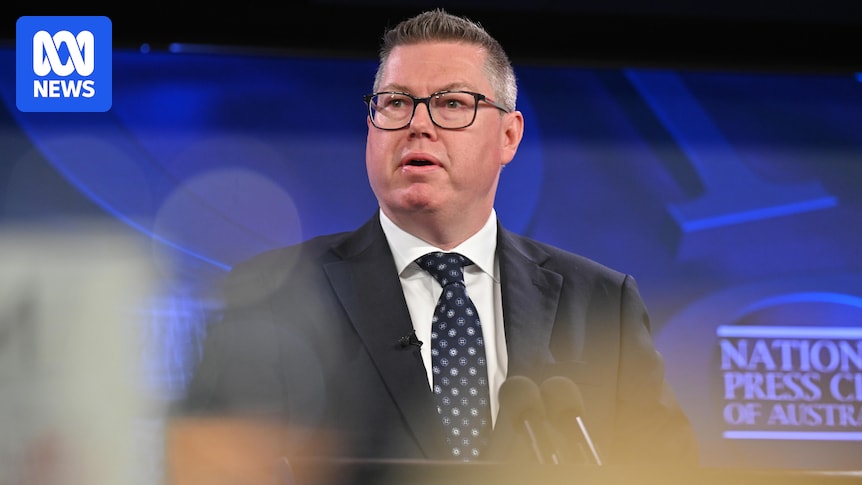The Trump administration’s review of the AUKUS partnership is unfinished as its slated deadline arrives, according to Australia’s acting defence minister.
Patrick Conroy told the ABC’s Insiders the Australian government was “engaging at the most senior levels” and was optimistic the US review would endorse the military pact.
“I’m confident it will support AUKUS just as our review of AUKUS [and] the UK review found,” he said.
“There’s been lots of speculation about what the timeframe is of the review … My last information is that the review has not been completed yet.”
The review, led by senior Pentagon official Elbridge Colby whose public statements about AUKUS have been mixed, was slated to be finished within 30 days, a timeframe reached this weekend which coincides with Anthony Albanese’s visit to China.
Bracing for pressure on defence spending
Despite the statements of confidence, the government is bracing for the likelihood that the Trump administration will press harder on Australia to lift its defence spending, as it did with European partners.
The ABC can reveal new figures laying out the colossal budget impact of agreeing to such a request.
During the election campaign, the Parliamentary Budget Office estimated the short-term boost to defence spending needed to achieve 3 per cent of GDP by 2035, as was Coalition policy, would cost $20.6 billion over the first five years and $156.4 billion over a decade.
ADF watching for Chinese spy ships
Those figures, prepared in consultation with Treasury and Defence, can be extended to suggest the even larger cost of a 3.5 per cent spend of $45.2 over five years or $287.1 billion over a decade.
The government currently intends to increase defence spending to 2.3 per cent of GDP by 2035.
To get to 3.5 per cent instead, the extra funding alone would triple Australia’s entire foreign aid budget by the year 2029-30.
Mr Conroy told the ABC the government would seek to emphasise that its aid and diplomatic spending, especially in the Pacific region, was also contributing to security.
“We’re making the point to everyone that both [defence and aid spending] are incredibly important,” he said.
“We’re investing in our relationships in the region, as well as our military capability and we are increasing our defence budget significantly, $57 billion above the previous trajectory,” he said.
“We’ve made it clear that if a case is made for more capability, we’ll increase more. We’re not going to pluck a figure out of the air and work out how to spend it. That’s what the Coalition took to the election.”
Mr Conroy, who is acting for Richard Marles in the defence portfolio but whose regular portfolio is defence industry, said Australia was also trying to get more value for money from defence procurement processes.
“It’s a challenging area for every country around the world [and] it was problematic under the last government … We’ve made significant reforms to how we do defence procurement,” he said.
“It is important that taxpayers have confidence that every single dollar goes to improving capability of the Australian Defence Force as well as supporting the 100,000 Australians who work in that industry.”
‘Sovereignty’ central amid reports of Taiwan request
Mr Conroy said Australia would not “engage in hypotheticals” after a report in the Financial Times that Mr Colby was also pressing both Australia and Japan to give assurances about how they would respond in the event of a war with China over Taiwan.
In a social media post following that report, Mr Colby did not address Taiwan directly but said the Pentagon had “made abundantly and consistently clear” it wanted allies to “step up their defense spending and other efforts related to our collective defense.
“This has been a hallmark of President Trump’s strategy in Asia as in Europe where it has already been tremendously successful,” he said, describing the pressure on NATO allies to spend more as a “formula” for other regions.
“Of course, some among our allies might not welcome frank conversations. But many… are seeing the urgent need to step up and are doing so.”
Mr Conroy told the ABC Australia would make its own decisions about any conflict.
Marles downplays Trump review of AUKUS
“The sole power to commit Australia to war or to allow our territory to be used for a conflict is the elected government of the day,” he said.
“Sovereignty will always be prioritised and that will continue to be our position.”
Officials have also emphasised Australia’s strategic focus on deterrence and opposition to the use of force.
“We are being very clear that we want a balanced region where no-one is dominated and no-one dominates,” he said.
